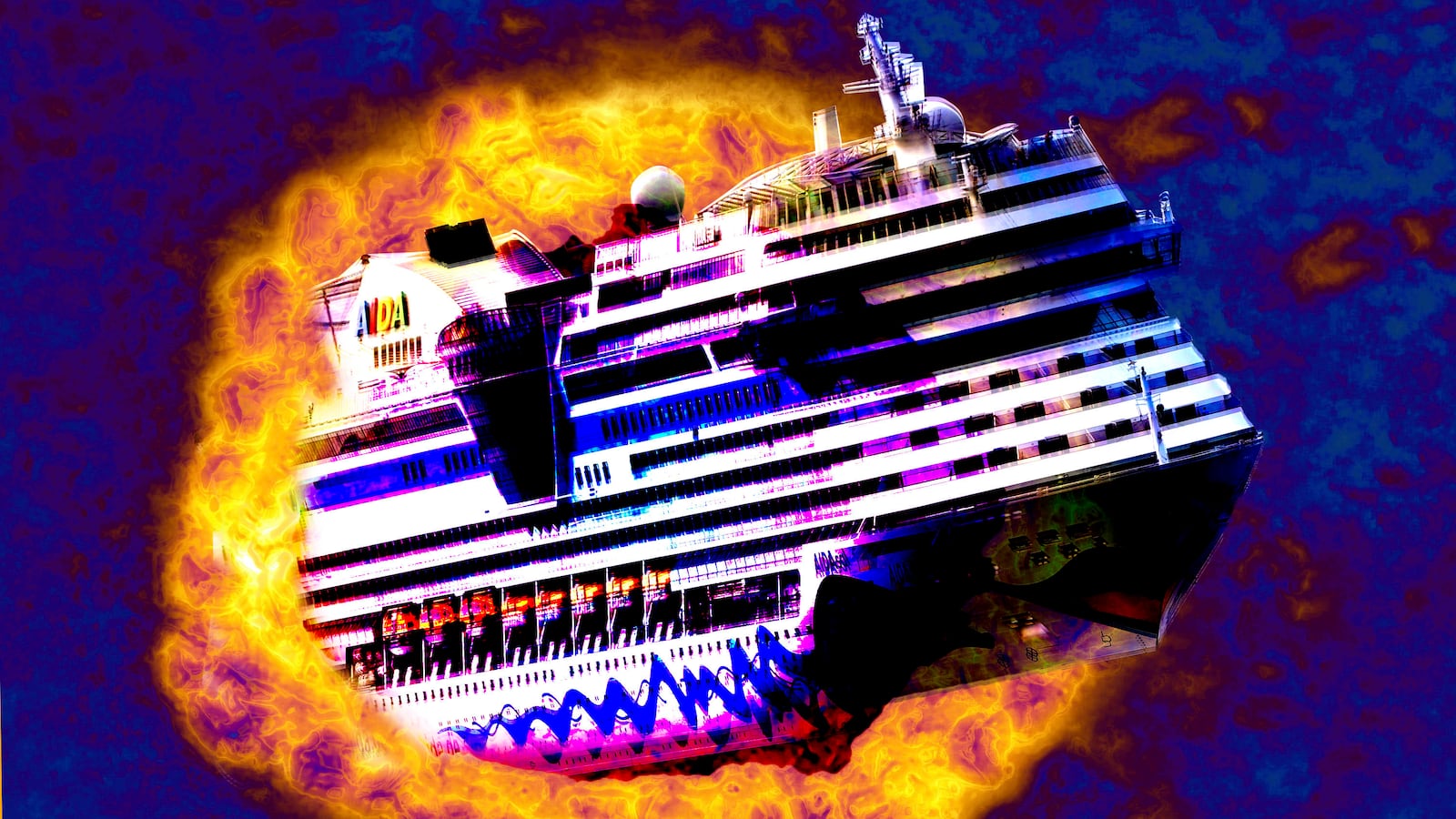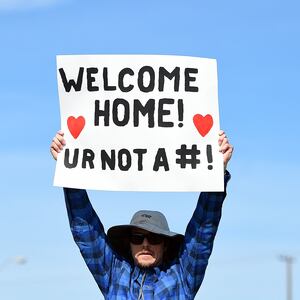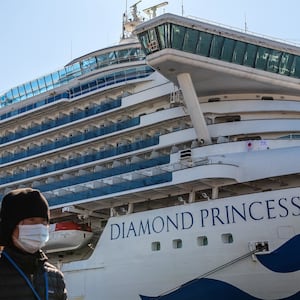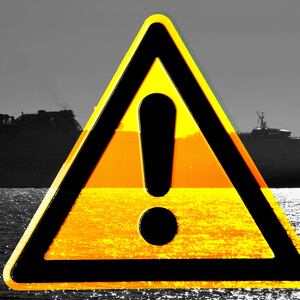The cruise ship industry is reeling. The outbreak of the new coronavirus has made the basic fundamentals of the business medically inadvisable to the point that the State Department has issued a warning to U.S. travelers—chief among them the elderly—to stop taking cruise ships until the threat has passed.
And yet, even as thousands of people have found themselves stuck on ocean liners, in close confines with others suffering from a deadly virus, not everyone is ready to bag their cruise ship getaway. Indeed, while some shudder at the prospect of enduring severe flu-like symptoms and a 14-day quarantine, others see the vacation deal of a lifetime materializing before their eyes.
Kenny Human, a 33-year-old lawyer from Kentucky, is one of those deal seekers. Five days ago, in the height of the coronavirus scare, he decided to purchase a Carnival Cruise trip leaving New Orleans in May for a venture through the western Caribbean. He doesn’t believe the coronavirus is a hoax. He doesn’t think fears of it are overhyped. And his girlfriend tried to convince him it was a bad idea. But, in the end, the price—about $400 per ticket when counting taxes and cancellation insurance—was just too damn good.
“I just have this natural inclination to buy low on things,” Human told The Daily Beast. “My girlfriend does think I’m crazy, but she is reluctantly on board, no pun intended.”
“I have to admit,” he added with a touch of sobriety, “your interest in wanting to speak with me does give me some doubts.”
Human is far from the only soon-to-be cruise ship voyager who has reassured himself that the disease won’t affect those who are young, healthy, and willing to take steps to avoid infection. It’s a touch of youthful hubris with a dash of a gambler’s high, all dropped into the milieu of a global medical crisis.
Take Ben Stults, a sophomore at Florida State University who is set to go on a cruise to Mexico this week with four of his college friends. His ticket was $500 and rather than eat the fee, he’s hoping to—in his words—”hit the sweet spot.” The sweet spot, in this case, is traveling to a region not yet hit hard by the coronavirus and getting the hell out before it becomes a problem. Just in case he misses that window, however, Stults brought a P100 respirator face mask, along with a deck of cards and Cards Against Humanity, in order to pass the time if he’s quarantined. He would have stocked up on hand sanitizer, he said, but the local Target was sold out.
Asked if he thought it was a good plan, he said, “Honestly, no.”
It’s not just the young, however, who are staring down the possibility of getting stranded on a coronavirus-infected cruise ship and asking themselves, “Why not?”
Both Brett Cimiotti, 58, of Connecticut, and his husband have degrees in microbiology and decided to book a cruise three weeks ago—a five-stop trip through Scandinavia that he fully admits he may end up having to cancel. “I’ve never been on one, never wanted to go on one, finally, I book one, and BOOM! Corona!”
Retired French professor David Lee, 78, is planning to fly to Peru in early April before boarding a boat down the Amazon River. His daughter, Katia, said of her parents, “They’re smart, but in this case seem to be really cavalier.” Her dad said it would be cavalier not to go. “We are a little nervous,” he conceded. “We are not planning on changing our plans unless there are cases down there.”
Paige Bade-Ankudovych, of Amityville, New York, is a 45-year-old teacher who rationalizes her decision to still consider cruising by noting that her profession already gives her a fair amount of exposure to viruses. She hasn’t yet pulled the trigger on the voyage she was planning to take with her husband and two kids to Bermuda. But she hasn’t ruled it out either. The gears in her head are practically audible as she debates the dos and don’ts.
“Do I want to be stuck with my two kids and my husband as we are up each others throats because of the quarantine?” she asks. “Would it be better to be in the middle of the Atlantic with free room service? At least I wouldn’t have to cook.”
The aoronavirus has forced the cruise-ship curious to tackle these types of introspective questions.
Already, several vessels have been held at sea after passengers on board became sick with—or died from—the disease or because there were passengers from countries with high infection rates. The Diamond Princess was held off the coast of Japan for 28 days last month as the coronavirus stalked its corridors, eventually sickening more than 600 and killing several. More recently, the Grand Princess liner heading through the Pacific saw 21 individuals on board test positive for coronavirus, after which the remaining 3,400 or so were told to stay in their rooms, instantaneously transforming the ship into a relatively plush floating prison. Passengers were left to plow through intense bouts of claustrophobia via a mix of menial tasks, momentary distractions, television binge watching and—on occasion—a healthy dose of booze. But that was merely the first phase of their ordeal. Medical experts have been conducting health assessments and, once disembarked from the ocean liner, passengers will still have a two-week isolation period in a military facility.
The cruise industry has been hit hard as a result, with executives meeting with top Trump administration officials to talk about what steps could be taken to steady their bottom lines. They’ve also sought to allay concerns by stressing the steps they’re taking to avoid becoming veritable petri dishes.
Matt Zettel, who booked a Disney Cruise this month, passed along the note he got from the organizers that said, among other things, that they were “closely monitoring global developments;” prohibiting people from boarding if they'd been to China, South Korea, Italy, Iran, or Japan in the past 14 days; and screening guests and crew for “gastrointestinal or flu-like symptoms.” But medical experts warn that if the coronavirus manages to find its way on board, the ship is not exactly the place you want to be.
“They’re not designed as quarantine facilities, to put it mildly,” Don Milton, an epidemiologist with the University of Maryland, told The Associated Press.
So why risk it?
For some, it’s simply a matter of dollars and cents.
Christine Luland, 49, of Toms River, New Jersey, is currently on a 14-night cruise through the Panama Canal. She boarded last week after it became apparent that there was no way to get back the $5,500 she’d invested; her only solace was that she was able to upgrade to the last available veranda so that she could get fresh air if a quarantine was imposed. “Of course the afternoon we boarded they suddenly announced that through the end of May you could cancel and rebook in the next 12 months with no penalty,” she said. “If they’d announced it a week earlier, I probably would have taken them up on it.”
Patrice O’Rourke, 58, of Middlesex County, New Jersey, paid full amount for a cruise she was set to take this May down to the Caribbean. What she did not get was travel insurance. So instead of losing the $5,000, she’s planning on going.
“We are not handling it well,” she concedes of the anxiety. “I’m just popping Xanax every hour. I haven’t begun snorting them yet. Once I start snorting it, then you know I'm nervous.”
But for others, the cruise ship vacation they had planned is simply too big a deal to give up because of some pandemic threat.
Briana McDougall, 33, of Seattle, has a cruise ship bachelorette party planned for April that has 30-plus people ready to go. “I wasn’t going to bring my work laptop, but if I go, I probably will now,” she said.
James and Kim Simon allowed their daughter to embark on a Royal Caribbean cruise this week because she’d planned the trip with 12 college friends for spring break.
“When she booked the trip, when we planned it, this wasn’t a factor,” said Kim. “So I was with her last weekend as the statistics were getting a little bit higher. And I asked her if she was at all worried. She thought if she just kept enough alcohol in her system it would ward off any germs. So I got her some Lysol wipes and the all you can drink package.”
And then there is Shannon Mulholland, whose story has no bits of gallows humor to make it easier to digest. She had planned a trip with her daughter for years as a college graduation present. And as a single mother who has dealt with medical issues for years, she doesn’t have the means to change it (indeed, she banked her vacation last year just to be able to take the time away).
So instead of walking away, she bought super deluxe N99 masks and was prepared to head off on March 31. A practicing Catholic, she was especially excited about the stops scheduled for Rome. But as she spoke to The Daily Beast, news broke that Italy was closing its borders to deal with the outbreak in its country.
“It was her graduation present from college and it is on my bucket list to go to the Vatican,” Mulholland said. “I want to cry with frustration.”









